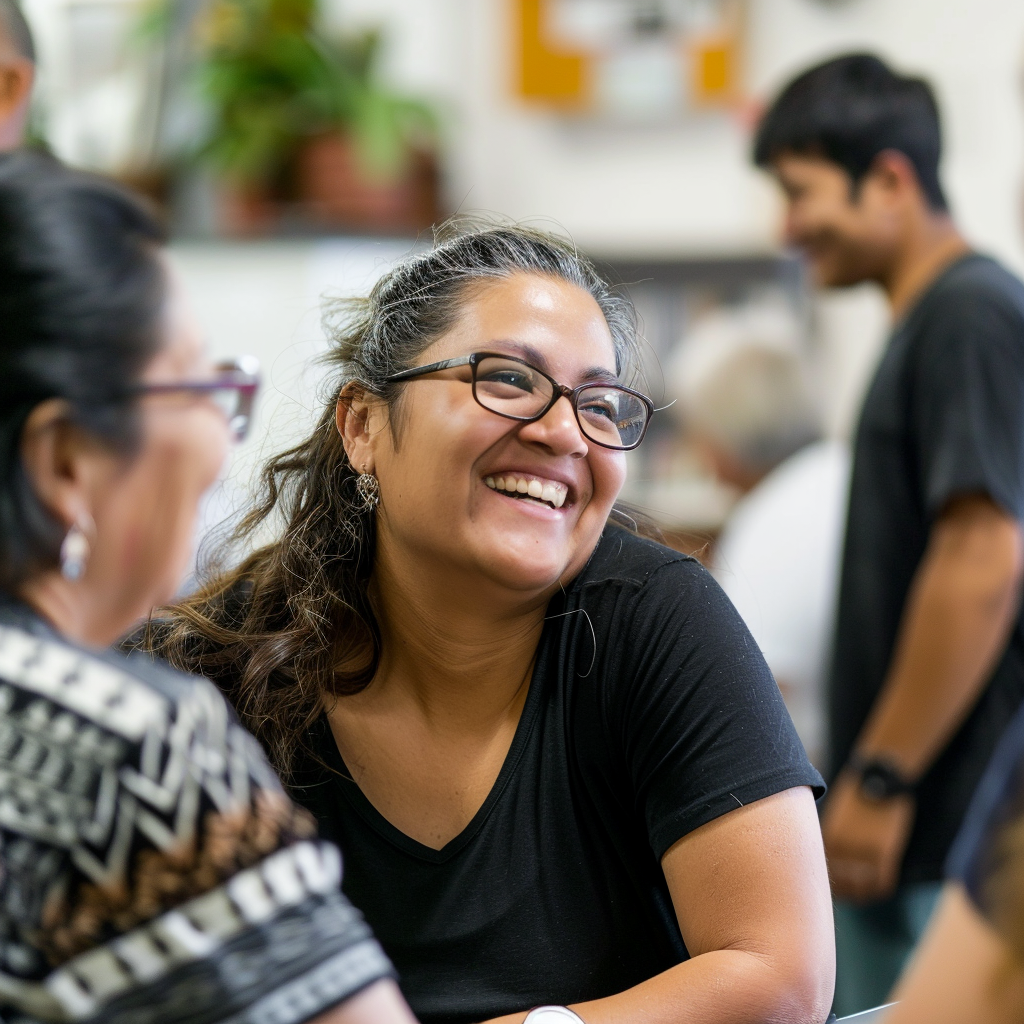Building Trust: Enhancing Your Relationships and Well-Being

Building trust is essential for interpersonal connection.
It's the quiet pillar that supports every strong relationship in our lives. Shaped by multiple interactions and nurtured through consistency, authenticity, and open communication, trust is an essential part of our wellbeing.
Trust is essential for healthier relationships within us and with others in our life — whether personal or professional.
In this article, I will explore the different facets of building trust and how it fortifies relationships and enhances mental health.
Let's dive deeper into the compelling world of trust-building for healthier, more fulfilling relationships.
What Does Building Trust Truly Mean?
We often hear about the significance of cultivating trust, but what does this term genuinely mean?
Trust is founded on faith, mutual respect, and the firm belief that the other party will not intentionally harm our well-being. It's about believing that the intentions and actions of the others are guided by honesty and good intentions.
Trust-building is a process that doesn't occur overnight; it demands patience, effort, and consistency.
Going deeper into the intricate process of building trust, it's important to remember this involves two simultaneous journeys — trusting yourself and trusting others.
Self-Trust

Self-trust deals with confidence in your own abilities, intuition, and decisions, making it an essential aspect of our personal growth.
Furthermore, it involves listening to one's inner voice and honoring it, even when external pressures suggest otherwise. When we trust ourselves, we are more likely to take risks, pursue our passions, and navigate life's challenges with resilience.
Cultivating self-trust requires self-awareness, self-compassion, and a willingness to learn from both successes and failures.
Trusting Others

Trusting others, however, is about being confident that another person will act in your best interest, respecting your emotional well-being, and preserving the sanctity of your relationship.
This involves vulnerability, as it requires opening oneself up to others. It's a delicate balance between discernment and openness, where we assess the reliability and intentions of others while remaining open to connection.
Cultivating trust with others often involves reciprocal actions and mutual respect, creating a dynamic where both parties feel valued and supported.
When trust is established in relationships, it fosters deeper connections and allows individuals to thrive in an environment of mutual understanding and support.
Both versions of trust share a symbiotic relationship — they both need to thrive for a healthy, fulfilling interaction.
What Building Trust Looks Like in the Workplace
Example: Jane

Jane, a young entrepreneur, embarked on a journey to understand and cultivate trust within her startup team. This exploration uncovered the dual nature of trust both (a) in oneself and (b) in others.
Jane realized that to inspire confidence within her team, she first needed to nurture her own self-trust. She came across the mantra "My word is my bond" and she lived this value in every area of her life. No more "white lies" as she realized they were just lies; no more empty promises to herself or others; no more ducking and weaving, she learned to show up to herself.
Jane lifted her game and developed a greater level of self-integrity. She couldn't ask her team to trust each other if she was flakey in herself. After several months of doing what she said she would do, she finally learnt to have greater trust in herself. This became a cornerstone of her leadership, enabling her to project reliability and competence.
Jane then worked on fostering a culture where team members felt valued and safe with her. She could see that the team responded to her changes as her team wanted to be near her more. She felt they would seek out her opinion or share wins with her more readily. They could see that she was committed to their emotional and professional well-being.
Key Factors: Integrity and Trustworthiness
A key element was that her team could sense that her actions now consistently aligned with her words. She was paying attention to their need for her to be trustworthy. She wanted them to feel valued by her and that their own needs were important to her. This effort in showing that she had their best interests at heart was pivotal in building a reciprocal trust.
Jane had no idea the extent to which creating a trusting environment would create psychological safety amongst the employees. Where there were once trust issues, there were now honest conversations and affective communication. Within months, this dual approach of strengthening self-trust helping team members feel safe while nurturing trust in others led to a more cohesive, efficient team and a modern workplace.
Research Reveals the Correlations Between Trust and Our Mental Health
According to a study published in the Journal of Personality and Social Psychology, those who consistently show up as trustworthy, that is reliable, transparent, and honest, are more likely to have stronger, more resilient relationships.
Psychology Today states that trust promotes psychological well-being as it decreases anxiety, fostering healthier stress responses and overall better mental health.
Research from the National Institutes of Health indicates that trust plays a significant role in mental health, with lower trust levels linked with higher rates of psychiatric symptoms.
A study presented by Harvard Business Review affirms that in a professional context, trust significantly impacts job satisfaction and productivity.
Transformative Rewards: The Benefits of Building Trust
Open and Effective Communication
Among the many benefits of building trust is the foundation it lays for open communication in relationships. Good communication is the lifeline of healthy relationships.
An important aspect is improving the employee experience by helping them to communicate openly, express honest thoughts, resolve conflict, and develop mutual trust. It's incredibly important for an organization to take practical steps to increase employee trust so they can build a trusting team.
When leaders build trust as an essential component of their business model, they improve employee engagement and can become high performing teams. Employee feedback typically reveals that improving workplace trust results in relationship building, more effective teamwork and collaboration, fostering a productive, harmonious workspace.
Example: BlueTech

Let's look at BlueTech, a rising tech firm in San Francisco, who recognized that employees wouldn't start cultivating trust without leading by example. They wanted to retain employees and build lasting relationships across their diverse teams.
Initially BlueTech struggled with siloed departments and a lack of openness, which hindered their collaborative efforts and innovation. They knew trust wouldn't happen automatically but with trust-building exercises, emphasizing transparency and open dialogue they saw improvements in internal communications and happier coworkers.
As trust grew within the team, employees had greater eye contact and felt more comfortable sharing ideas, expressing concerns, and offering feedback without fear of judgment or backlash. This was also apparent in their virtual team.
This newfound openness led to a flourishing of creative ideas and enhanced ability to solve problems. There was greater public recognition of those who operated with integrity and respect, which became a positive feedback loop where others wanted to emulate these qualities and associated behaviors.
Team members began to engage in more meaningful conversations and were able to stay calm. They shared not just professional insights but personal experiences as well, which further deepened their bonds.
The result was a noticeable improvement in project outcomes, as well-rounded perspectives were now considered. BlueTech's journey is just one example of an organization who replaced self-serving behaviors and disconnected employees with trusted leaders using effective communication to create an inclusive culture with mutual respect and shared goals.
Promoting Resilience
Cultivating trust also promotes resilience in relationships.
Relationships can have ruptures as issues arise or disagreements erupt. However, when there is sufficient trust in relationships, people tend to find ways to repair the rupture. That's the critical component — repair.
When ruptures occur, it takes a certain amount of resilience to look at one's own capacity for causing harm, not just when you feel hurt or wronged. Feeling victim-like is easy, the skill is taking responsibility and growing from the rupture and then finding ways for rebuilding trust.
Whether it's your personal relationships or a team member in your organization, trust implies:
"I trust that we can confront this problem together" or
"I trust in our ability to resolve our issues constructively."
This security brings robustness to relationships, making them more respectful and honest.
Example: Haven

Haven is a local community center who faced a significant crisis when government funding cuts threatened its existence. Team meetings caused stress and uncertainty among employees as trust issues increased. Group members felt unable to put forward their own ideas or share their own values.
Six months prior, Haven's general manager had retired, and they brought someone in from outside. This person stifled professional growth and employee satisfaction. They were replaced with an internal promotion and the team swiftly recovered due to the fact Haven had created a strong foundation of trust throughout the prior years between the management, staff, and the community.
As the leaders confronted these difficulties, they were transparent about the challenges with their team as they knew sharing the truth builds trust within the organization. Haven ensured open communication, collective problem-solving, and a shared commitment to the center's mission. As there was still sufficient emotional trust within the workplace, employee engagement increased significantly again.
This example at Haven became a testament to their resilience, as the center not only survived but emerged stronger, with a more committed and interconnected community. Trust acted as a resilient force, enabling relationships to endure the challenges and to strengthen through them.
Navigating the Obstacles in Building Trust

Trust forms the bedrock of any relationship, be it personal or professional. However, the journey towards fostering significant trust is often fraught with challenges. The most prominent hurdle is past experiences and the resulting insecurities they may breed. Prior betrayals, disappointments, or rejections can create a nagging fear and self-protective barrier that becomes a hindrance in trusting again.
Lack of transparency is another factor that can derail the trust-building process. In the absence of open and honest communication, misunderstandings flourish, casting shadows of doubt. It's difficult to trust when pertinent information is withheld or masked.
Lastly, inconsistency in behavior also poses a substantial challenge. Trust demands reliability over time. Frequent changes in words or actions create uncertainty and make it taxing to depend on someone, thereby shaking the very foundations of trust.
Implementing Strategies for Overcoming Trust-Building Hurdles
Practicing Forgiveness
When trust has been broken then working towards forgiveness can help you live life without carrying the baggage of an old hurt.
Example
At Smiling Hearts Therapy Center, a significant breakthrough occurred when the team had a seminar on practicing forgiveness. A long-standing rift between two senior therapists had created tension which affected other group members.
The seminar encouraged open discussions and the expression of past grievances in a controlled environment. Both therapists felt a greater understanding of the underlying issues, felt increased empathy for the other, and made a decision to forgive each other. A noticeable shift occurred and the two of them had a renewed sense of camaraderie and trust.
Ensuring Transparency
Actively cultivating open and honest communication and having transparent processes can reduce misunderstandings and foster trusting relationships.
Example

Greenfield Enterprises made a drastic shift from secretive practices to ensuring transparency in the workplace. This revolutionized the company and its workplace culture. In the past, the management team had been criticized for withholding information and this caused employees to feel somewhat suspicious, and even at times, paranoid about Greenfield.
Once they made a conscious decision to adopt an open-door policy and regularly share company updates employees immediately felt more valued and involved in the decision-making process. They enjoyed cross department relationships.
Developing Consistency
Displaying reliable and consistent behaviors over time breeds trust as it establishes predictability and security.
Example
Oakwood High School completely transformed trust building from the board all the way to the students. They had not developed any consistent practices for building trust within the school and this led to frequent leadership changes and teacher turnover. This had the knock-on effect of destabilizing the parents as they lost faith in the school's rhetoric not aligning with their actions.
One year ago, they appointed a new principal who was committed to long-term goals, and within months there were noticeable changes. Her consistent approach in policy implementation, communication, and decision-making enhanced trust in the workplace. The teachers and parents enjoyed her stability and predictability, and the whole system calmed into a thriving institution.
Emotional Openness
Learning to express one's own emotions and allowing others to do the same can create an atmosphere of authenticity that builds trust and fosters respect in one another.
Example
At Apex Corp the CEO shared her notions about adding emotional openness as a core value. This marked a turning point, and she was able to vocalize her own professional challenges and personal experiences in staff meetings.
This act of vulnerability-built trust and encouraged others to communicate openly about their feelings and challenges. Within a short time, a culture of empathy was forming, and deeper connections formed.
Patience and Time
For most people in an organization, trust building takes time and patience.
Example

There were two rival companies, ClickTech and Lexus Industries who were to collaborate on cutting edge tech designs, however there was little trust. In fact, employees from both companies were skeptical and cautious in the interactions as there had been competitive conflicts in the past.
A mediator was brought in for six months to build trust helping to facilitate consistent interactions, emotional support on projects, and offering ways to understand the differing workplace cultures and values. This process took time and patience and helped to transform their complex relationships and mutually beneficial partnerships.
A Methodical Approach to Building Trust: Step-by-Step Guide
1. Reflect on Past Experiences
Look within yourself to understand how your attitudes towards trust have been shaped by past experiences. Acknowledge how these affect your current perspective of trust in relationships.
2. Commit to Openness and Honesty
Ensure that you're transparent in your communications as hidden agendas and half-truths erode trust. Honesty, even when it's uncomfortable, is vital.
3. Maintain Consistency
Strive for consistency in your actions and words as mixed signals and unpredictability can thwart trust-building efforts.
4. Express Emotions Accurately
Authentically express your feelings and create the space for others to do the same. It fosters a sense of safety and understanding — both necessary for developing trust.
5. Cultivate Patience
Building trust takes time, so have patience with yourself and others.
6. Practice Active Listening
Listening to understand rather than react strengthens trust. When people feel heard and valued, they are more likely to trust.
7. Respect Boundaries
Recognizing and respecting personal boundaries can greatly enhance trust, whereas overstepping boundaries can lead to feelings of violation and mistrust.
8. Provide and Accept Feedback
Constructive criticism needs to be delivered with kindness and this can enhance trust. Accepting feedback is vital — even if you don't agree with what has been said — but it is respectful and grown up to hear the feedback and question its validity. This enhances trust.
9. Show Empathy
Seek to understand others' perspectives and empathize with their feelings, as empathy fosters a deeper connection and enhanced trust.
10. Consistently Work on Conflict Resolution
Many relationships have ruptures or disagreements. Handling those with fairness, understanding, and a focus on resolution can increase trust substantially.
Extra Insights for Amplified Trust-Building
Embrace Vulnerability
Being open about your fears and insecurities can enhance intimacy and foster trust.
Celebrate Accomplishments
Celebrating each other's successes conveys support and solidarity, enhancing trust in the process.
Stand by Commitments
Make only those commitments that you can keep and then stand by them. Trust is built on the reliability of actions.
Maintain a Positive Attitude
A positive attitude during conflict resolution can almost always result in more beneficial outcomes, solidifying trust.
Invest Time
Spend quality time with each other as shared experiences can strengthen trust.
Understand the Concept of Trust
Trust isn't just about not lying or cheating. It's about emotional security, reliability, and mutual respect.
Be Patient
Trust requires time and nurturing to develop so be patient with the process. Persistence is key in trust building.
Seek Professional Help if Necessary
If you find it challenging to develop trust, consider seeking professional guidance from a psychotherapist or counselor. With my wealth of experience in psychotherapy and counseling, I can guide this process effectively.
Frequently Asked Questions on Building Trust
What is building trust?
Building trust is a process where through reliable actions, truthful communication, and consistency over time, people establish confidence and faith in one another. It's a foundational aspect of all types of relationships.
What are the 7 principles of building trust?
The 7 guiding principles of building trust are:
-
clear communication
-
consistency in actions
-
connection through empathy
-
consideration of others' feelings
-
competence in one's role
-
commitment to the relationship
-
keeping confidentiality sacred
How can you build trust?

Building trust in the workplace was exemplified by Riverwood Hospital.
Riverwood Hospital's leadership team implemented a process where feedback to the hospital could be made anonymously by employees, patients or family and friends of patients. They wanted to know what they didn't know or couldn't see about how they were performing. They focused on honest and clear communication ensuring that everyone could have a voice that was heard and then responded to.
Within the workplace they wanted employees to trust each other and the leadership team. They focused on actively listening to one another and respecting personal boundaries. They also implemented an initiative where they regularly acknowledged and appreciated each other's contributions. This reinforced a positive and supportive atmosphere where they could increase trust.
Whenever any conflict arose, the leadership team addressed them responsibly and constructively. This revealed their commitment to maintaining and strengthening trust. It took time to build trust in the workplace and it required continuous effort, yet they were committed to take the time needed to develop a strong, cohesive, and trusting hospital community.
What are the 3 fundamental elements of trust?
The three fundamental elements of trust are credibility, reliability, and intimacy.
Credibility refers to the trust one has in someone being truthful.
Reliability touches on the predictability of a person's actions.
Intimacy signifies the safety one feels when entrusting someone with sensitive information.
Consolidating Insights: The Journey Towards Building Trust
Building trust is pivotal in every relationship and nurtures one's mental health. We delved into the intricacies of trust, understanding its importance, benefits, the challenges often encountered, and the effective strategies to overcome them. This step-by-step guide provided a structured approach for cultivating trust, supplemented with additional tips for reinforced understanding.
We also answered frequently asked questions, offering a comprehensive view of what trust-building truly entails. However, as you've seen, trust isn't grown overnight — patience, persistence, and consistent effort form the foundation. Each step towards building trust is a step towards fostering healthier, deeper, and more fulfilling relationships. Remember, the journey is as rewarding as the destination.
Continue the Journey
For further self-development and relationship skills improvement, I highly recommend checking out one of my online programs, Fight Less, Love More by Lissy Abrahams. This self-paced program is designed to help you further invest in the quality of your relationships across life's domains.
Ready to invest in building trust and nurturing healthier, more fulfilling relationships? Let's start this transformative journey together.



